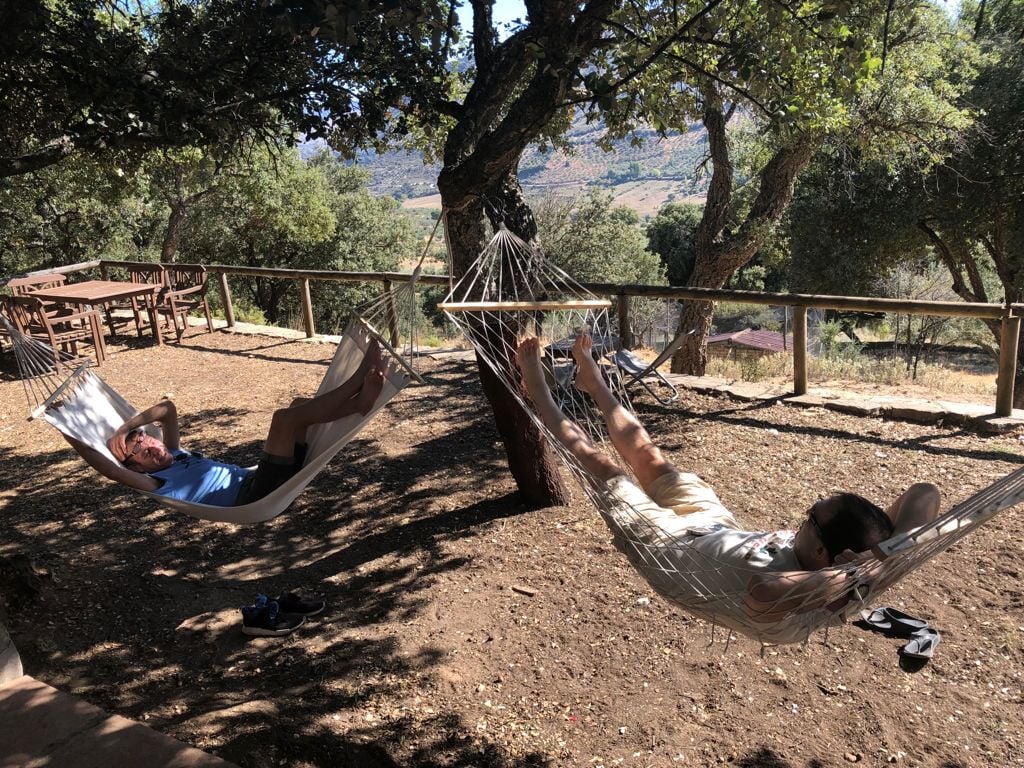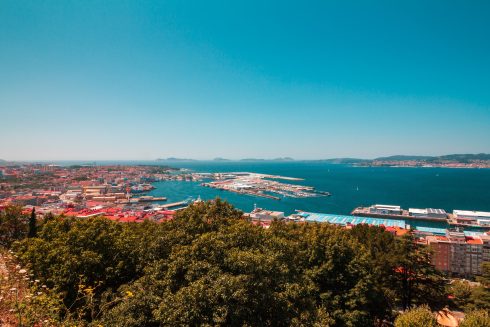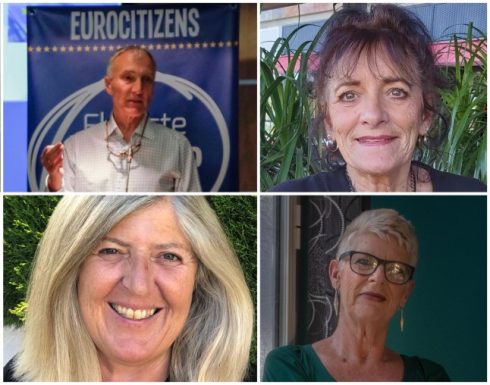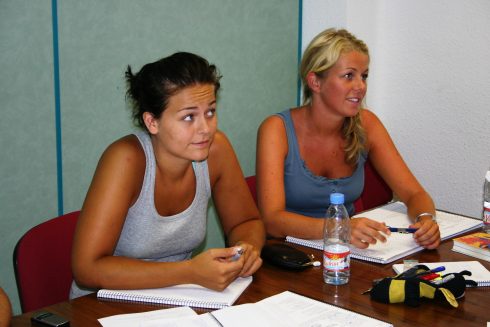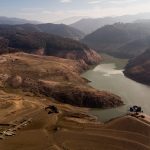I hadn’t held a ferret in 40 years, and the feeling of its long body squirming in my arms and the smell of old urine on its fur reminded me that many of the cutest creatures are best admired from a distance.
“The hunters around here used ferrets to go into rabbit holes and flush out the rabbits. That’s illegal now because they kept eating the baby rabbits.” This was Umberto speaking, the keeper of the ferret and the 27-year-old manager of Secret Paradise, a finca where a gaggle of us expats sat around a long outdoor table gazing over endless rolling hills of olive trees.
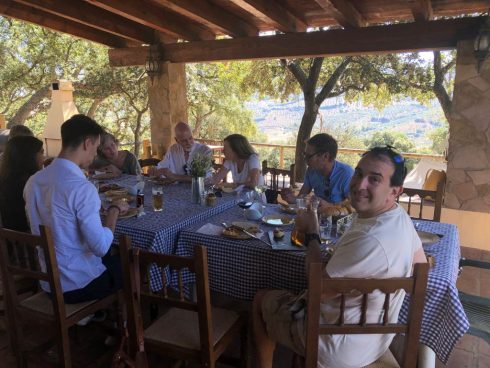
The resonant silence of the surrounding Guadares Valley gobbled up the occasional ebb in our boisterous conversations; miles of stillness sprinkled with the bray of a distant donkey or the far-off shriek of a hawk.
I felt a rustling on my feet and reached down with one hand expecting to touch a dog’s head, but instead found a hard, variegated surface, like an oversized pencil someone had chewed upon.
I reached down just as something grabbed a mouthful of my leg hair and pulled, eliciting a scream from me and a sound from my leg eerily similar to that of grass being uprooted. The others erupted in laughter as Jimmy the goat came trotting out from where my legs had been.
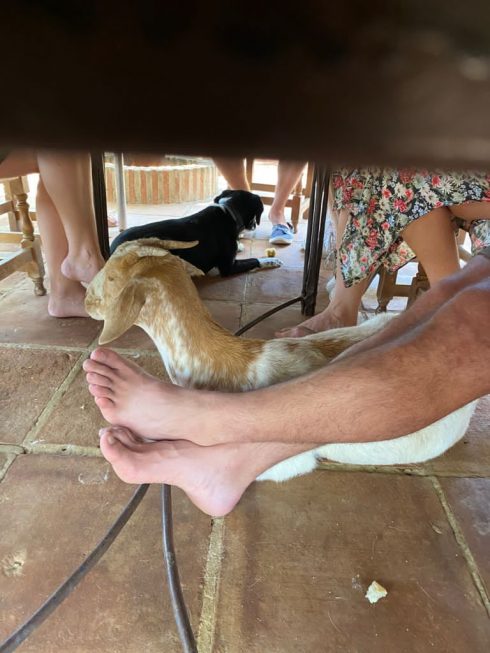
For us extranjeros and so many like us, “authentic Spain” means residing in a small town and eating tapas, learning some Spanish and getting to know a few locals.
My wife Selena and I live in Ronda among about thirty-five thousand people, the largest of the Pueblos Blancos, the white hill towns that dot the mountainous landscape east of Sevilla. In the mountains around us are many much smaller pueblos, and dominating the landscape between them is the landscape itself—vast expanses of farms, ranches, natural parks and open space.
It had taken us most of a year after our arrival to peel back the layers of insulation provided by “authentic” restaurants and small-town shops before we were given a glimpse of the way so many native rural Spaniards actually live.
The food and water that animate our blood comes from the real Spain, the places outside of town, and the people who make our urban lives possible live in relative obscurity.
Eighty percent of the Spanish reside in cities, but the remaining 20% make their homes in the large swaths of wild open space that account for well over 90% of the country’s landmass. Whereas in England, France, and Germany you can’t go far without seeing other people, in Spain you can travel many kilometers without encountering anything more than campo—open unpopulated space.
The socioeconomic difference between those who live in urban centers and those who do not can be dramatic, and the economic disparities between the people in rural and urban parts of Spain are a significant and growing political issue. Prior to Covid, tens of thousands of rural Spaniards had been taking to the streets of Madrid in what has been called the “Revolt of Empty Spain.”
With disperse populations, medical services, public transportation and educational opportunities are literally few and far between. A digital divide is also widening, as rural areas are not being given equal access to the internet. As such, these citizens are demanding help as their towns and municipalities are losing their youth, who flee for cities in search of opportunity.
And since the boys are still taught much more of the farm work, those who are leaving are disproportionately female. According to Spain’s Centro de Estudios sobre Despoblación y Desarrollo de Áreas Rurales, in 1950 about 40% of Spain’s population lived in towns of 2,000 or fewer inhabitants.
Since then, 40-50% of the rural population has moved off the land, leaving over half of Spain with less than 5-10 people per square kilometer. All of this while the overall population of Spain has gone up by about 60% during that same period.
Umberto was raised in this very house in this valley between Montejaque and Villaluenga—both villages with less than 1,000 inhabitants, where young people are a small percentage of the overall population. Like so many of his demographic compañeros, Umberto wanted more from his life than sheep and olive trees.
He left for the greener grass of London as soon as he was of age, and later Amsterdam. After most of a decade away, he started to sour on the pace and stresses of city life and couldn’t imagine growing older and starting a family in that milieu.
“I dreaming of the air, the silencia, the stars over the house, the Milky Way I could see it with no moon,” he told me. “I missed animals, smells. I had to leave to appreciate it. Now I love it.” He and his girlfriend, Laura from Brazil, decided to try living on the land once again.
But this time with a twist: With his new command of English and French and degrees in marketing, they would invite extranjeros into their campo lives to keep things interesting. We were some of the first they’d brought into their world, the land Umberto had grown up on and had unselfconsciously named, “Secret Paradise.”
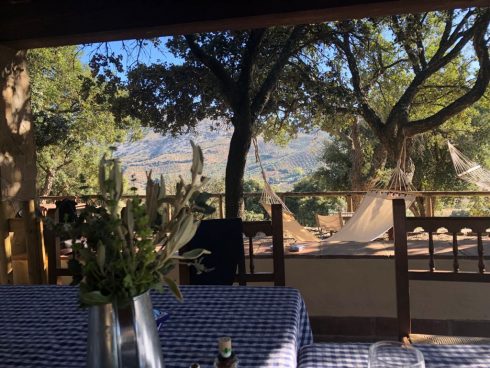
A woman in my Spanish class had met Umberto by chance, and she got a group of us together to hang out at Secret Paradise for the day in celebration of another classmate’s birthday. We met in Montejaque, where those of us with small cars parked and piled into Umberto’s hulking old Toyota Land Cruiser.
From there he guided us out on rough dirt tracks over a small mountain and into a verdant valley dotted with ancient almond and olive trees, slowing down to point out various features. We descended into the valley and crossed a dusty, dried out riverbed next to a stone bridge that was broken out through the middle, enormous shaved limestone blocks still lying where they had fallen centuries before.
“This bridge, it was built in 1650,” Umberto informed us. “When the Napoleon’s troops came to Spain, they was coming from Sevilla, and they was walking across the bridge, and 200 people of Montejaque and Benaojan—it was these people against 700 French. It was a battle. And we say that we won. I don’t know if it’s true or if it’s not, but we don’t speak French, so I think that we won.”
Legions of olive trees were peppered with others that had bark missing from the ground up to about six or eight feet. “These trees with their no pants? These are cork. Cork trees. I have been working the cork trees since 4 am. You must wait for the hottest, driest week of the year, and you cut it. Then you have to wait many years to cut it again. Very hard, this work.”
We entered into a shady stretch under the outstretched branches of a stand of oaks.
A group of sheep huddled over the bumpy track to escape the punishing summer heat. Umberto stopped and had me jump out from the seat next to him to shoo them off the road. “Just yell at them, ‘vamos, venga.’ They listen. They speak Spanish.”
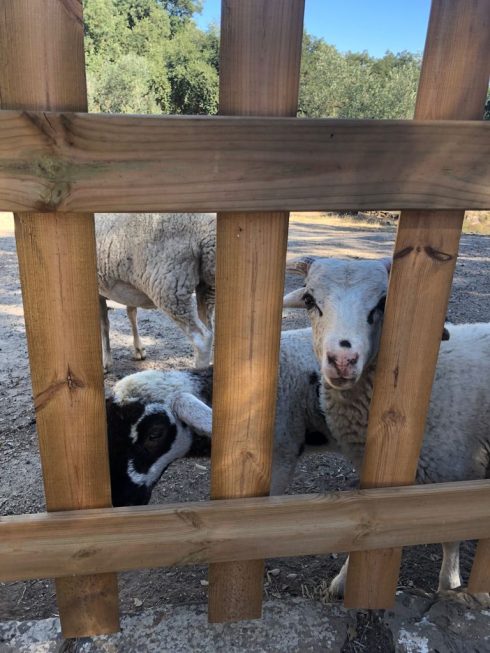
I climbed down and walked toward them with my arms wide as I’d seen the goat herders do on my bike rides. Outfitted in flip flops and surf shorts, peals of laughter erupted from our friends in the car behind me.
“Get after ‘em, honey!” my wife called out in her southern drawl as the sheep lifted tired haunches from their siestas, pebbles of poop pouring out their backsides like a slot machine all around my uncovered feet. Selena was raised with this in rural Texas. I could see now why she was obsessed with shoes.
Twenty minutes on the dirt road led us to a gate in front of Umberto’s house where Lolo the hunting dog greeted us, along with Kiara, a Spanish Mastiff the size of a linebacker. Mastiffs are the guard dogs of Andalucia, but the truth is they are mostly bark, easy to outrun with a few sharp turns.
If they did catch up to you, you’d be more threatened by their abundant saliva than their teeth. With Kiara’s heft in this heat, every movement was a task, and she moved with the economy of a tai chi master. Her tail waved slow and rhythmic, offsetting large swinging nipples—evidence of the 12 puppies she’d recently birthed.
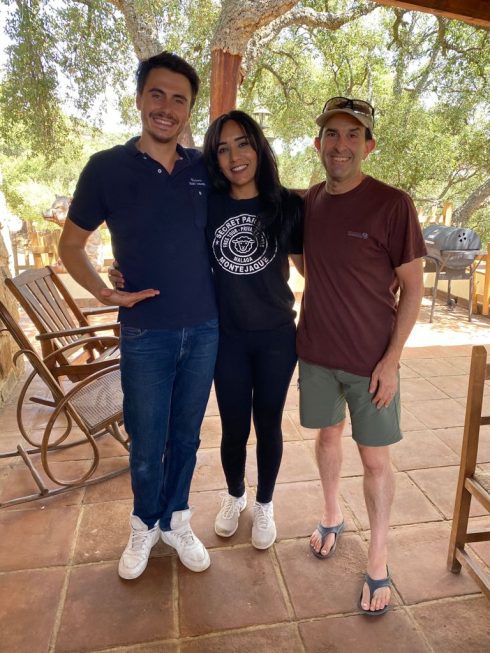
Laura greeted us at the house and welcomed us to relax on the terrace while Umberto’s mother Rosa stood in an apron off to the side. The three of them assembled on the terrace together, Umberto at 6 foot 2, tall, dark, and easy with a toothy, dimpled grin. If he hadn’t studied marketing, he could’ve been a model. The same could be said of Laura, with her jet-black hair, perfect white teeth and preternaturally tanned skin. Rosa was short and compact with a shy smile and looked far too young to be the mother of Umberto.
“Welcome guys to my Secret Paradise,” said Umberto. “Relax, enjoy the hot tub, the hammock, hang out. Anybody want anything to drink?” We all wanted water, and Umberto turned to go into the house while Rosa took to a corner of the deck where a huge circular pan sat atop a wide butane stovetop.
While the others sat down and chatted, I went over to Rosa who was pouring water over hot paella, bringing forth a hissing aromatic steam that smelled of fish. Yellow rice sizzled as she stirred, with flecks of red saffron and green pepper coming to the surface and diving down again alongside shrimp tails and clam shells.
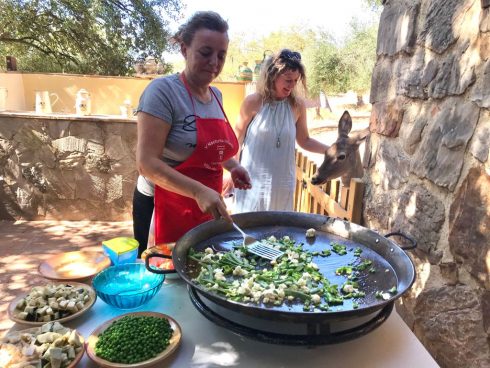
Rosa was reserved, likely on account of not speaking any English, but when I asked her about the paella, she launched into a 15-minute description of the process. She spoke in the mealy-mouthed Spanish that typifies the campesinos of Andalucia—eliminating all the Ss and Rs, talking as if she had a gum ball in her mouth. I took comfort knowing that even native Spanish speakers from outside the area have a tough time understanding Andaluz. I acted like I understood, more entranced by the attention I got from her than by whatever she was saying.
Laura came out of the house next with bowls of fresh bread and glass containers full of a thick juniper syrup she poured onto a few plates.
“This is our olive oil, from here,” said Umberto. “It looks different, this olive oil, because it’s fresh and has not oxidized, and has a lot of chlorophyll in it. Taste it. But as you eat, just be careful of the animals, they are not all tame and they love the bread.”
As if on cue, a dog could be heard barking close by and a large presence came rushing from around the corner of the house. Lolo the hunting dog was in hot pursuit of a full-grown deer. The deer stopped abruptly at the table and next to our friend Elaine, who let out a little cry in surprise, hands flying next to her head. “This is Celine,” Umberto said now. “She is a very nice deer.”
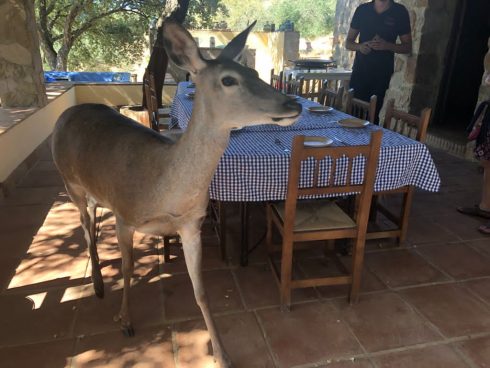
We raised her like the dogs since she was small, because her mother abandoned her.” Several of us went over to Celine before Lolo piped up again, envious of the attention paid to the doe. He barked and nipped at her heels until she took off again, zero to sixty in what seemed a second or two.
As we sat munching on bread and impossibly delicious olive oil, Umberto and Laura brought out a series of dishes. Blackberries. Sliced tomatoes covered in garlic, parsley and more olive oil. Queso Payoyo, a soft goat cheese specific to the next valley over. “As the clouds comes thousands of mile from across the Atlantico, the first thing they hit over here is that mountain,” Umberto said, pointing to the largest of the rolling hills to the west. “The rain makes good grass for the goats and sheep, and this is why that village over there, Villaluenga, it is known as the place for the Payoyo cheese.”
Upon devouring the assorted masses of deliciousness, we all sat back in our chairs, wine in hand, more than sufficiently sated. Umberto’s mother appeared at the end of the table, her arms wide with a steaming pan of paella. “I hope you save some appetite,” Umberto said as the pan was set down carefully on its own high bench.
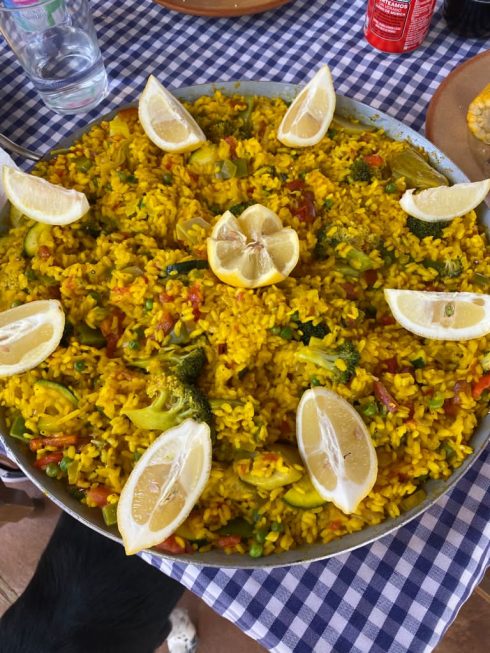
We were full, but no matter. We piled our plates high with the golden arroz, flecked with the greens of broccoli and peppers and peas and artichokes; the reds of saffron and pepper. As we ate, Celine returned to lord over the table, staring her blank deer face at each of us. Chickens, goats and dogs passed under the table while ducks sat on chairs behind us flapping their wings and wagging their tails left and right.
Two hours after the bacchanal had begun, the ten of us could be found strung out over every available surface—some on the high benches that surrounded the terrace, a few on hammocks, others in reclining deck chairs. All lightly groaning with full bellies as the menagerie rotated amongst us. Laura and Umberto came out the back door and took stock, their hands on their hips. “Wow, you’re all useless now. But just one more thing,” he said. Soon the two of them were passing out shot glasses.
“Oh no,” Selena groaned from across the terrace. “We’re gonna drink now?”
“Just a little,” Umberto said with a smile, producing a large bottle of dark liquid. “This will help move the food,” he said, filling each of our little tumblers with the cold, beige liquid. “This is ‘pacharán,’ a digestif of Basque origin that is popular all over Spain.”
“What is this I smell?” Alima the birthday girl asked from a hammock, sniffing at her glass.
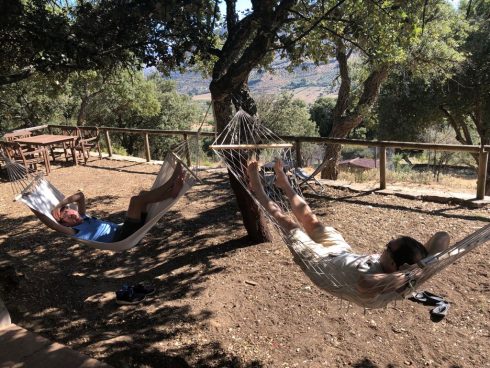
“It is anus,” Laura the Brazilian replied with some pride. “We make it ourselves. You put coffee beans, sloe, cinnamon, and of course anus, which can smell strong.”
“Uh, anus?” another friend asked with wide eyes
“No, anise, the herb,” a Brit named Lisa answered as we all laughed.
“An-ees” Laura corrected herself.
“Very big difference,” Lisa said over her eyebrows.
As the laughter died down, Kiara the Mastiff ambled over to me in my Adirondack and sat down with a sigh. Her enormous, panting head was even with my shoulder, and I patted her with one hand as my other held a glass of pacharán against my distended stomach. Her weight too much in a seated position, Kiara walked her front legs forward and down next to me, resting her jowls across my ankles. With a mighty exhale, she let loose a cascade of salivary effluent like a burst water balloon all over my feet. A word to the wise: If you choose to visit a farm, best not to wear sandals.
Have a friend coming to town or just looking for an exceptional local experience?
Secret Paradise opens in late May and is available to groups of 2 to 15 people for lunch or dinner. Prices vary from about 15-30 euros per person, which includes transportation from nearby Montejaque. Umberto and Laura also organize walking tours of the area and will soon open a bed and breakfast onsite. They speak fluent English, Spanish, Portuguese, French, and some Dutch, and can accommodate most dietary preferences. For more information, call or WhatsApp +34 628 38 69 03, email [email protected], or check out Secret Paradise on Facebook
About the author: Jason Luban is an acupuncturist in Ronda, Spain. This article is excerpted from his forthcoming memoir, “Moving: An American’s Search for Health and Balance in Spain.” Jason may be reached at [email protected].

